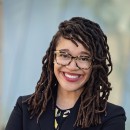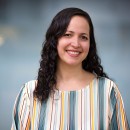Research Office News
Pages
 William Elliott Discusses College Savings Accounts with St. Louis Public Radio
William Elliott Discusses College Savings Accounts with St. Louis Public RadioProfessor William Elliott III joined St. Louis Public Radio in a spirited conversation about college savings accounts and their potential. The conversation was prompted by St. Louis Public Schools’ recent decision to pause its partnership in the College Kids Savings Account program.
- January 9, 2024
- Learn more »
 Shawna Lee Named Co-Editor-in-Chief of Children and Youth Services Review
Shawna Lee Named Co-Editor-in-Chief of Children and Youth Services ReviewProfessor Shawna Lee has been appointed as a new Co-Editor-in-Chief of Children and Youth Services Review.
“I am excited to take on the role of Co-Editor-in-Chief at Children and Youth Services Review. I look forward to working with the other editors to continue to increase the representation of BIPOC scholars, international scholars and junior scholars on the CYSR team,” said Lee. “One of the things that I appreciate about Children and Youth Services Review is its focus on children's experiences. The journal places children's experiences and the impact of policy and practice on children at the forefront. In so doing, CYSR centers youths' perspectives.”
- January 3, 2024
- Learn more »
 Matthew Smith Appointed Associate Dean for Research
Matthew Smith Appointed Associate Dean for ResearchProfessor Matthew Smith was appointed the Associate Dean for Research, effective January 2024. In this role, he oversees the Office of Research, which supports faculty research endeavors, fosters a vibrant research culture, and ensures compliance with relevant policies.
Smith joined the School faculty in 2017. His research and scholarship focus on modifying and delivering behavioral interventions for a broad spectrum of vulnerable and underserved populations. He is the director of the Level Up: Employment Skills Simulation Lab, which develops and evaluates technology-based interventions to help obtain and sustain employment for people from marginalized and underserved communities. Specifically, Smith partners with members of the autism, mental health and returning citizen communities to develop employment-focused tools and evaluate them in real-world settings including high schools, community health agencies and prisons.
- January 3, 2024
- Joonyoung Cho Named a 2024 Grand Challenges Doctoral Fellow. Rita Hu Receives an Honorable Mention
PhD student Joonyoung Cho has been named a 2024 Grand Challenges Doctoral Fellow. His project “Contact Frequency with Children Following Relocation Later in Life: Do Contact Modes and Proximity to a Child Matter?” addresses the Grand Challenge to Eradicate Social Isolation. These fellowships work to broaden the pipeline of social workers equipped for and committed to tackling and surmounting the Grand Challenges. PhD student Rita Hu received an honorable mention for her project “The Role of Social Relationships in The Internalization and Consequence of Self-Perceptions of Aging Across the Life Span.”
- December 20, 2023
 Katrina Ellis Named the Next James S. Jackson Emerging Scholar
Katrina Ellis Named the Next James S. Jackson Emerging ScholarAssistant Professor Katrina Ellis has received the James S. Jackson Emerging Scholar Award from the Program for Research on Black Americans (PRBA) at the U-M’s Institute for Social Research. Ellis’ research seeks to improve racial health equity, with a specific focus on cancer and family-focused approaches to understanding, preventing, and managing health conditions among Black Americans.
The James S. Jackson Emerging Scholars Award is designed to support emerging scholars who are often at an especially creative and productive yet fragile career stage. It is named in honor of U-M Professor James S. Jackson, the pioneering social psychologist known for his research on race and ethnicity, racism and health and aging among Black Americans and health and aging among Black Americans.
- December 18, 2023
- Learn more »
 Ashley Cureton Awarded a Humanities Grant through Michigan Humanities
Ashley Cureton Awarded a Humanities Grant through Michigan HumanitiesAssistant Professor Ashley Cureton received a Humanities Grant through Michigan Humanities, funded in part by the National Endowment for the Humanities. The Humanities Grants emphasize collaboration among cultural, educational and community-based organizations and institutions in order to serve Michigan’s people with public humanities programming.
Together with Jewish Family Services of Washtenaw County and local schools throughout Ann Arbor and Ypsilanti, Cureton will work with refugee youth to capture their pre-migration and resettlement experiences. The project will include the creation of a literary comic book as a way to provide guidance to future resettled refugee youth, their families, refugee resettlement agencies and schools on how to manage the difficult process of resettlement.
“Through the use of storytelling and the arts, we look forward to gaining a better understanding of how refugee youth across Washtenaw County navigate the resettlement process, which can often be quite overwhelming,” said Cureton.
- November 14, 2023
 Fernanda Cross Named a 2023 Anti-Racism Research & Community Impact Faculty Fellow
Fernanda Cross Named a 2023 Anti-Racism Research & Community Impact Faculty FellowAssistant Professor Fernanda Cross has been named a 2023 Anti-Racism Research & Community Impact Faculty Fellow. The Anti-Racism Collaborative is a partnership of U-M’s National Center for Institutional Diversity with the provost’s anti-racism initiatives and is intended to help support, connect and amplify scholars across the U-M campus who study racial inequality, racial equity and racial justice. The fellowship provides funding to support Cross’ research titled Addressing the Mental Health Needs of Latinx Youth in Washtenaw County.
- October 31, 2023
- Learn more »
 Karla Goldman on the Legacy of the Triangle Shirtwaist Factory Fire
Karla Goldman on the Legacy of the Triangle Shirtwaist Factory FireProfessor Karla Goldman wrote in The Conversation about the new memorial commemorating the 1911 Triangle Shirtwaist Factory fire victims, most of whom were Jewish and Italian young women and girls. One of the deadliest workplace disasters in U.S. history, the tragedy inspired worker protections and invigorated labor activism.
“The memorial offers a bold and graceful reminder not only of the fire but of its imprint on the world we inhabit today,” wrote Goldman.
- October 31, 2023
- Learn more »
- Rebeccah Sokol Writes in The Conversation About Ways to Reverse the Rise of Gun Deaths in U.S. Youth
Assistant Professor Rebeccah Sokol wrote in The Conversation about both the increase in gun deaths among children and teens and the research-backed strategies and tools to reverse this trend. “Reducing young people’s access to unsecured and loaded firearms can prevent firearm-involved deaths across all intents including suicide, homicide, and unintentional shootings.” The editorial also ran in the San Francisco Chronicle and the Chicago Sun-Times.
- October 31, 2023
- Learn more »
 Matthew Smith Receives $3.16 Million Grant from NIMH
Matthew Smith Receives $3.16 Million Grant from NIMHProfessor Matthew Smith has received a $3.16 million award from the National Institute of Mental Health for his project “A Hybrid Effectiveness-Implementation RCT of Virtual Interview Training for Autistic Transition-Age Youth.”
The project will be used to offer virtual job interview training in 16 Michigan and California schools over the next three years. Once in the program, students will practice interviewing for various jobs, such as cashier, food service worker and greeter, among other positions.
Pre-employment transition services are federally-mandated by the Workforce Innovation and Opportunities Act (2014) to prepare autistic transition-age youth for the workforce prior to exiting high school. While most job interview training programs can be limited — students may role-play with teachers once or twice — Smith’s virtual interview training program provides the opportunity for multiple practice sessions with increasing difficulty.
The grant builds upon previous efforts involving virtual interview training for transition-age youth. In that study, the training improved interview skills, lessened interview anxiety, and led to more students finding competitive employment within six months of completing the program, Smith said.
The project also includes a partnership with San Diego State University, which will provide an opportunity to study participation in cultural diverse communities.
- October 5, 2023